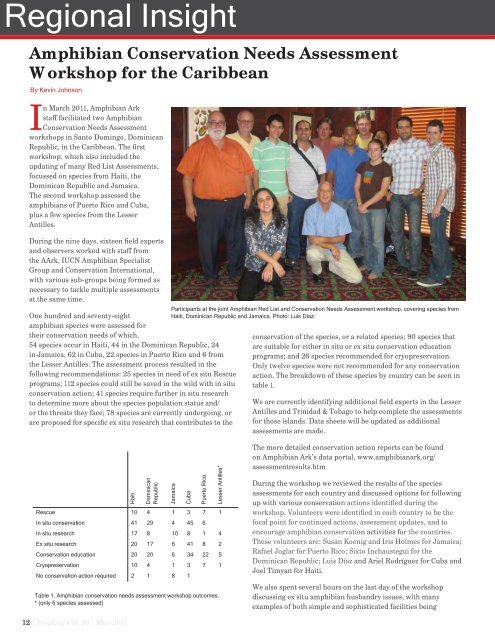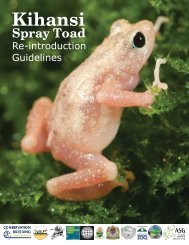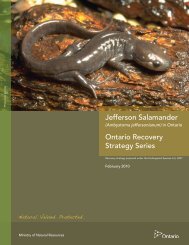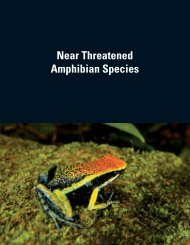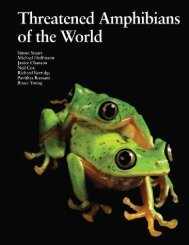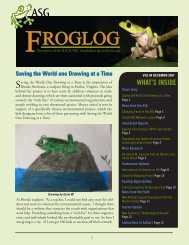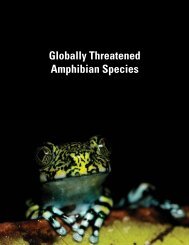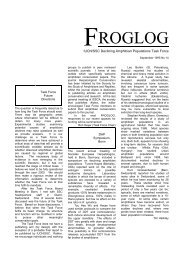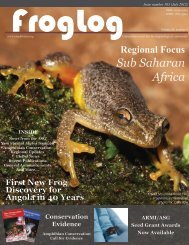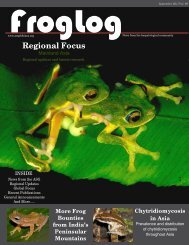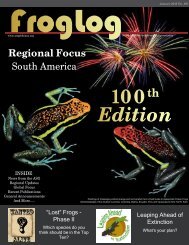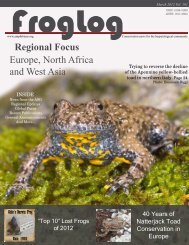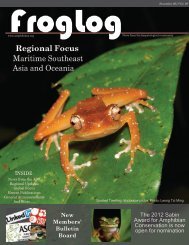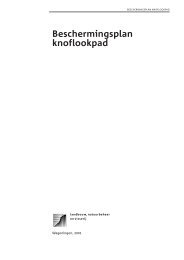download the FrogLog 96 - Amphibian Specialist Group
download the FrogLog 96 - Amphibian Specialist Group
download the FrogLog 96 - Amphibian Specialist Group
Create successful ePaper yourself
Turn your PDF publications into a flip-book with our unique Google optimized e-Paper software.
Regional Insight<br />
<strong>Amphibian</strong> Conservation Needs Assessment<br />
Workshop for <strong>the</strong> Caribbean<br />
By Kevin Johnson<br />
In March 2011, <strong>Amphibian</strong> Ark<br />
staff facilitated two <strong>Amphibian</strong><br />
Conservation Needs Assessment<br />
workshops in Santo Domingo, Dominican<br />
Republic, in <strong>the</strong> Caribbean. The first<br />
workshop, which also included <strong>the</strong><br />
updating of many Red List Assessments,<br />
focussed on species from Haiti, <strong>the</strong><br />
Dominican Republic and Jamaica.<br />
The second workshop assessed <strong>the</strong><br />
amphibians of Puerto Rico and Cuba,<br />
plus a few species from <strong>the</strong> Lesser<br />
Antilles.<br />
During <strong>the</strong> nine days, sixteen field experts<br />
and observers worked with staff from<br />
<strong>the</strong> AArk, IUCN <strong>Amphibian</strong> <strong>Specialist</strong><br />
<strong>Group</strong> and Conservation International,<br />
with various sub-groups being formed as<br />
necessary to tackle multiple assessments<br />
at <strong>the</strong> same time.<br />
One hundred and seventy-eight<br />
amphibian species were assessed for<br />
<strong>the</strong>ir conservation needs of which,<br />
54 species occur in Haiti, 44 in <strong>the</strong> Dominican Republic, 24<br />
in Jamaica, 62 in Cuba, 22 species in Puerto Rico and 6 from<br />
<strong>the</strong> Lesser Antilles. The assessment process resulted in <strong>the</strong><br />
following recommendations: 25 species in need of ex situ Rescue<br />
programs; 112 species could still be saved in <strong>the</strong> wild with in situ<br />
conservation action; 41 species require fur<strong>the</strong>r in situ research<br />
to determine more about <strong>the</strong> species population status and/<br />
or <strong>the</strong> threats <strong>the</strong>y face; 78 species are currently undergoing, or<br />
are proposed for specific ex situ research that contributes to <strong>the</strong><br />
Participants at <strong>the</strong> joint <strong>Amphibian</strong> Red List and Conservation Needs Assessment workshop, covering species from<br />
Haiti, Dominican Republic and Jamaica. Photo: Luis Diaz.<br />
conservation of <strong>the</strong> species, or a related species; 90 species that<br />
are suitable for ei<strong>the</strong>r in situ or ex situ conservation education<br />
programs; and 26 species recommended for cryopreservation.<br />
Only twelve species were not recommended for any conservation<br />
action. The breakdown of <strong>the</strong>se species by country can be seen in<br />
table 1.<br />
We are currently identifying additional field experts in <strong>the</strong> Lesser<br />
Antilles and Trinidad & Tobago to help complete <strong>the</strong> assessments<br />
for those islands. Data sheets will be updated as additional<br />
assessments are made.<br />
Haiti<br />
Dominican<br />
Republic<br />
Rescue 10 4 1 3 7 1<br />
In situ conservation 41 29 4 45 6<br />
In situ research 17 8 10 8 1 4<br />
Ex situ research 20 17 6 41 8 2<br />
Conservation education 20 20 6 34 22 5<br />
Cryopreservation 10 4 1 3 7 1<br />
No conservation action required 2 1 8 1<br />
Table 1. <strong>Amphibian</strong> conservation needs assessment workshop outcomes.<br />
* (only 6 species assessed)<br />
Jamaica<br />
Cuba<br />
Puerto Rico<br />
Lesser Antilles*<br />
The more detailed conservation action reports can be found<br />
on <strong>Amphibian</strong> Ark’s data portal, www.amphibianark.org/<br />
assessmentresults.htm<br />
During <strong>the</strong> workshop we reviewed <strong>the</strong> results of <strong>the</strong> species<br />
assessments for each country and discussed options for following<br />
up with various conservation actions identified during <strong>the</strong><br />
workshop. Volunteers were identified in each country to be <strong>the</strong><br />
focal point for continued actions, assessment updates, and to<br />
encourage amphibian conservation activities for <strong>the</strong> countries.<br />
These volunteers are: Susan Koenig and Iris Holmes for Jamaica;<br />
Rafael Joglar for Puerto Rico; Sixto Inchaustegui for <strong>the</strong><br />
Dominican Republic; Luis Díaz and Ariel Rodríguez for Cuba and<br />
Joel Timyan for Haiti.<br />
We also spent several hours on <strong>the</strong> last day of <strong>the</strong> workshop<br />
discussing ex situ amphibian husbandry issues, with many<br />
examples of both simple and sophisticated facilities being<br />
12 | <strong>FrogLog</strong> Vol. <strong>96</strong> | May 2011


